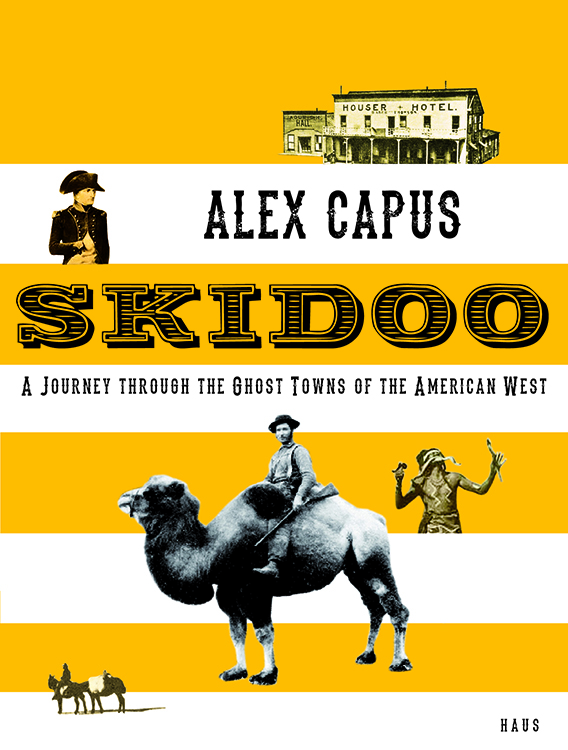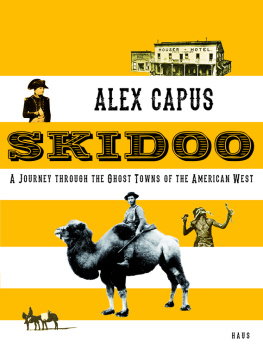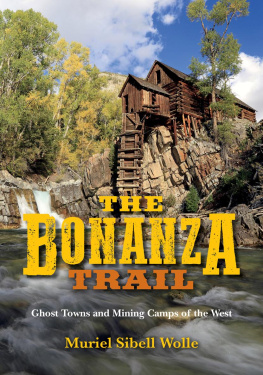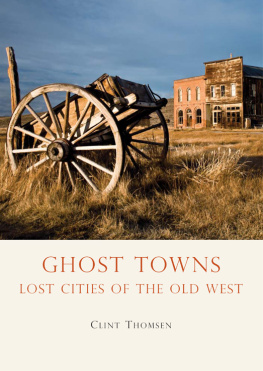Capus Alex - Skidoo: a journey through the ghost towns of the American West
Here you can read online Capus Alex - Skidoo: a journey through the ghost towns of the American West full text of the book (entire story) in english for free. Download pdf and epub, get meaning, cover and reviews about this ebook. City: West (U.S.);West United States, year: 2014, publisher: Haus Publishing;Armchair Traveller, genre: Detective and thriller. Description of the work, (preface) as well as reviews are available. Best literature library LitArk.com created for fans of good reading and offers a wide selection of genres:
Romance novel
Science fiction
Adventure
Detective
Science
History
Home and family
Prose
Art
Politics
Computer
Non-fiction
Religion
Business
Children
Humor
Choose a favorite category and find really read worthwhile books. Enjoy immersion in the world of imagination, feel the emotions of the characters or learn something new for yourself, make an fascinating discovery.
- Book:Skidoo: a journey through the ghost towns of the American West
- Author:
- Publisher:Haus Publishing;Armchair Traveller
- Genre:
- Year:2014
- City:West (U.S.);West United States
- Rating:4 / 5
- Favourites:Add to favourites
- Your mark:
- 80
- 1
- 2
- 3
- 4
- 5
Skidoo: a journey through the ghost towns of the American West: summary, description and annotation
We offer to read an annotation, description, summary or preface (depends on what the author of the book "Skidoo: a journey through the ghost towns of the American West" wrote himself). If you haven't found the necessary information about the book — write in the comments, we will try to find it.
Skidoo: a journey through the ghost towns of the American West — read online for free the complete book (whole text) full work
Below is the text of the book, divided by pages. System saving the place of the last page read, allows you to conveniently read the book "Skidoo: a journey through the ghost towns of the American West" online for free, without having to search again every time where you left off. Put a bookmark, and you can go to the page where you finished reading at any time.
Font size:
Interval:
Bookmark:

A journey through the ghost towns
of the American West
by
Alex Capus
Translated by John Brownjohn

Wherever I go in the world, I always tend to linger in small towns that have only a few thousand inhabitants and remind me of Olten, my home town in Switzerland. Recently I found myself in Bodie, a gold-mining ghost town east of the snowy peaks of the Sierra Nevada in north-east California. Ten feet of snow can cover the place in winter its 8,379 feet above sea level and the ground freezes so hard that in 1877, when people still lived and died there, graves had to be excavated with dynamite.
Boom, boom, boom! Detonations rent the frigid air from dawn to dusk, for the miners died like flies from diphtheria and pneumonia and the ground trembled and window panes vibrated in crumbling putty and the townsfolk counted the explosions, knowing that each betokened a death.
The grandest funerals of all were held by the Chinese who ran the laundries, restaurants and opium dens on King Street, China being an advanced civilization thousands of years old in which people have been dying for far longer than they have in youthful America. When someone passed away in Chinatown, the mourners scattered snippets of red paper along the route to the graveyard, which was a mile out of town, to protect the soul of the deceased from attack by the devil. This was because the Evil One had to pick up every last snippet before he could get to work on the deceaseds soul, by which time it would long since have disappeared into heaven.
So that the soul should lack for nothing on its journey, it was a traditional Chinese practice to deposit all kinds of food on the grave. The wind wafted the scent of spring rolls, Canton rice and sweet-and-sour duck breast across the surrounding hills, where it aroused the interest not only of wolves and bears, but also of the Paiute Indians, whose supplies often ran short at the end of winter. It is on record that the Paiute swiftly acquired a profound ethnographic knowledge of Chinese burial rites, and because they, for their part, had mastered the art of sneaking up on things unobserved and in silence, the finest feasts in Paiute villages were always held after Chinese funerals.
Anyone fortunate enough to leave Bodie on horseback, with head erect and heart still beating, instead of vertically and heaven-bound, came sooner or later to the next small town, and from there to another small town, and from there to yet another. Bodie was surrounded by small towns, which were in turn surrounded by small towns indistinguishable from each other. The Wild West differed little in that respect from the Black Forest, Tuscany or the Alps, except that American small towns are not situated within sight of each other, but separated by tracts of land capable of swallowing up the whole of the Black Forest, all of Tuscany, and the entire Swiss Alps.
Within these expanses there are fire-spewing volcanoes and mountains of magnetic iron, petrified forests, boiling hot rivers and frightful chasms that yawn so deep into the earths interior you feel youre looking at the dawn of Creation and wouldnt be surprised to see dinosaurs browsing down there. The trees soar into the sky, so tall and massive you can bore holes through the trunks and drive carriages through them, and the bears, when they rise on their hind paws to attack, are not the height of a man but twice or three times as tall. I can well imagine how terrified the earliest prospectors of 1849 must have been men who until a few months previously had been bank clerks in Cracow or policemen in Toulouse or farmhands in Tuscany the first time they saw a grizzly bounding towards them, and how horrified they would have been by the fact that the beast did not drop dead when you emptied the magazine of your Smith & Wesson into its fur, and I wonder why, given that Americas flora, fauna, topography and climate were so far off the human scale, those people didnt simply turn around and go home to Cracow, Toulouse or Tuscany.
Many of them really did turn around. There are also said to have been some who kept on heading west until they had rounded the globe and ended up back in Europe. But a remarkable number possibly because they lacked the price of a passage home put down roots on the way, usually in small towns, because nearly all American towns were small. In 1875, for instance, the Californian coastal settlement of Los Angeles had 7,000 inhabitants, only twice as many as 19th-century Olten, my home town.
On the western edge of Death Valley lies Panamint City, which is reputed to have been founded by some desperados who had attacked a Wells Fargo stagecoach and fled with their haul to the remote Surprise Canyon to wait until the guardians of the law either lost their urge to pursue them or transferred it to the next stagecoach robbers. That could take a very long time or a very short one. On the one hand, Wells Fargo had made it a rule to put 300 dollars on the head of every robber, regardless of identity; on the other, stagecoaches were always being robbed, and bounty hunters tended to hunt the most recent quarry because any traces of earlier robberies quickly disappeared in the trackless West.
The bandits waited for three days, two weeks, a month. They had brought plenty of food with them and got their drinking water from a small stream at the foot of the canyon. The canyon was situated in the Shoshone Indians tribal area, but there was no sign of the Indians themselves. Although a little vegetation grew on the banks of the stream, the rest of the terrain was all stones and rattlesnakes. From time to time a rabbit or a coyote would scamper past. By day the desperados played cards; at night they roasted a rabbit or a coyote.
In movies a bandits daily routine looks picturesque and romantic, but the reality of life outside the law was insufferably monotonous and boring. Personally, I only once renounced the company of women and children this was in the late summer of 1964 in order to lead an outlaws life of freedom and independence behind the bramble hedge. I had to cut this venture short after only a few hours because I realized that the company of earthworms, snails and ants would not entirely satisfy me in the long term.
At some stage, one of the desperados filled in time by going for a walk up the side of the canyon. He hummed a tune and picked some wild thyme with which to season the next roast rabbit, then sat down in the shade of an overhanging rock and tossed stones at lizards standing stock-still in the blazing sun as they diagonally raised one foreleg and one hind leg in the air to cool them. The bandit suddenly noticed a strangely glittering quality about the stone he was about to throw. Having hammered it to bits with his pistol butt, he discovered that it contained a large proportion of high-grade silver. He summoned his friends, and it transpired that Surprise Canyon embraced an area five miles long and two-and-a-half wide in which veins of silver ran close together.
The men were overjoyed by their discovery. They were now richer than they could ever have become by robbing stagecoaches. The only trouble was, their wealth would have to remain hypothetical for as long as the Wells Fargo stagecoach incident prevented their return to legality. The record would have to be wiped clean in some way.
At that time in Virginia City, Nevada, there was a state senator named William W. Stewart who had made a fortune as a lawyer specializing in prospectors licences and was known to be helpful in such cases. Legend has it that the robbers decided to fill their saddlebags with silver ore, ride to Virginia City, and ask this man for help. The senator thereupon asked Wells Fargo how many kilograms or hundredweight of silver it would take to cancel out the regrettable stagecoach business. One gathers that Wells Fargo promptly quoted a weight Senator Stewart spoke many years later of 12,000 to 20,000 dollars and the criminal aspect of the matter was tacitly waived.
Font size:
Interval:
Bookmark:
Similar books «Skidoo: a journey through the ghost towns of the American West»
Look at similar books to Skidoo: a journey through the ghost towns of the American West. We have selected literature similar in name and meaning in the hope of providing readers with more options to find new, interesting, not yet read works.
Discussion, reviews of the book Skidoo: a journey through the ghost towns of the American West and just readers' own opinions. Leave your comments, write what you think about the work, its meaning or the main characters. Specify what exactly you liked and what you didn't like, and why you think so.







